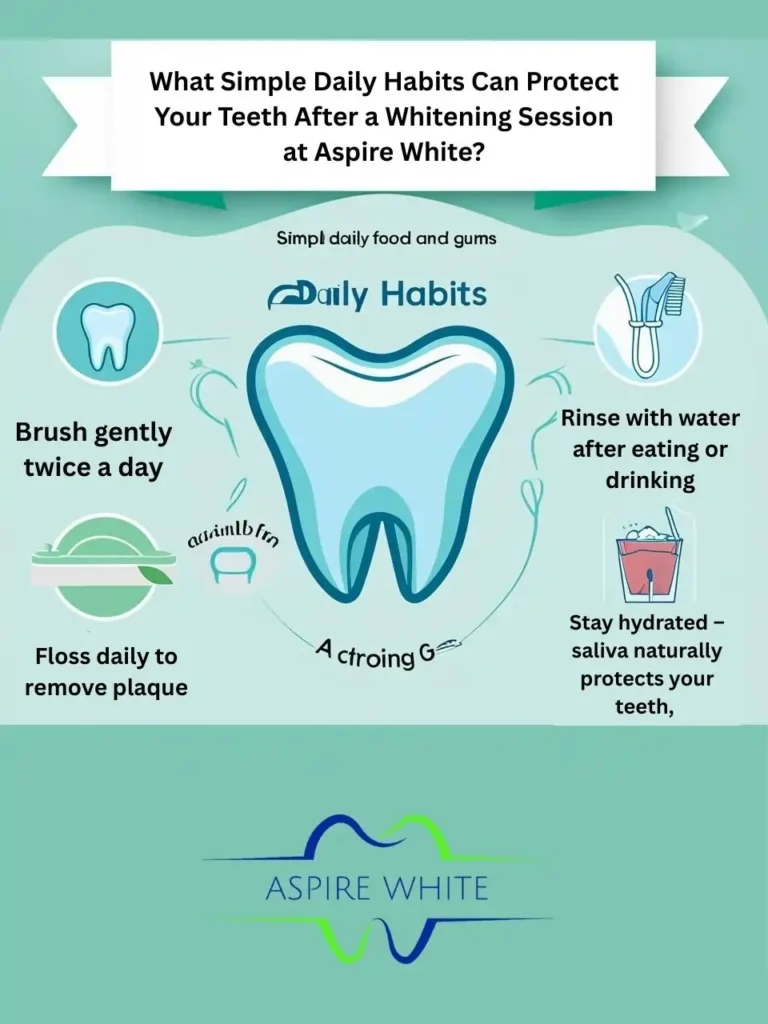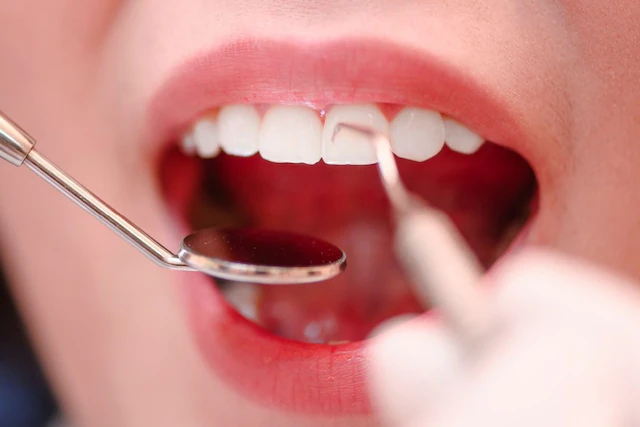At Aspire White Hinckley, we believe a truly radiant smile begins with strong, healthy teeth. Whitening is the final touch, but the real magic happens when you lay the groundwork with excellent dental care. Think of it as preparing a perfect canvas before painting—your smile will only look its brightest and healthiest if the foundation is well cared for.
Daily habits make all the difference:
- Brush your teeth twice daily with a fluoride toothpaste to strengthen enamel.
- Floss or use an interdental cleaner to remove plaque between teeth.
- Visit your dentist regularly for professional check-ups and cleaning.
When your teeth and gums are healthy, our at-home laser whitening treatment can deliver brighter, longer-lasting results that truly stand out. Aspire White your local laser teeth whitening experts
Ever wondered how your daily habits might be silently impacting your smile Hinckley?
Small actions you barely think about can quietly affect the health and colour of your smile.
That midday sugary drink, skipping flossing before bed, or even sipping tea slowly throughout the day—all of these can contribute to staining, plaque build-up, and gum issues over time.
At Aspire White Hinckley, we often meet clients excited for whitening who are surprised by how much routine habits have influenced their teeth’s appearance.
The good news is that small changes—like rinsing with water after snacks, brushing soon after a latte, or cutting down on sugary drinks—can significantly improve dental health and make your whitening results last longer.
Want a fresher breath and healthier gums—what small changes can make significant differences?
Fresh breath and gum health aren’t complicated to achieve—it’s about consistency. Simple habits like:
- Brushing your tongue to remove odour-causing bacteria.
- Flossing daily to clear food particles and plaque.
- Drinking more water to keep your mouth hydrated.
- Chewing sugar-free gum to boost natural saliva production.
Our clients at Aspire White Hinckley often find that improving gum health also enhances whitening results, because healthy gums frame the teeth beautifully. A fresh, healthy mouth is the best backdrop for a whiter smile.
Curious how brushing properly can protect your heart and brain over time?
It might surprise you, but oral health is directly linked to your overall health. Poor brushing habits can cause gum disease, which studies have connected to heart disease and even cognitive decline. See Here Is Whiter Teeth More Important Than Good Dental Health?
Brushing correctly—with gentle, circular motions for two minutes twice a day—not only removes plaque but also reduces the risk of harmful bacteria entering your bloodstream.
At Aspire White Hinckley, we view whitening as part of a broader health picture. A bright smile is beautiful, but a healthy smile is priceless.

String floss, interdental brush, or water flosser—which tool best suits your smile?
Choosing the right cleaning tool depends on your teeth and lifestyle:
- String floss – perfect for tight spaces between teeth.
- Interdental brushes – great for slightly wider gaps or those with braces.
- Water flossers – ideal for people who find traditional flossing uncomfortable.
At Aspire White Hinckley, we encourage you to experiment and find what feels most comfortable. Whatever you choose, remember: consistency matters more than the tool itself. Clean teeth mean better whitening results and a healthier smile overall.
If your gums bleed when you floss, will maintaining consistency provide relief?
In most cases—yes. Bleeding gums are often a sign of plaque-related inflammation. When you floss daily, you remove the bacteria and irritants, allowing your gums to heal and strengthen.
Many Aspire White clients notice a significant improvement in just two weeks of regular flossing. Healthy gums not only look better but also make your whitening results more even and attractive. Instant results, whitening, Procedure Duration, and Technology
Are your dietary cravings feeding your cavities—and how could smarter choices help your smile?
Your diet plays a huge role in oral health. Sugary treats, fizzy drinks, and starchy snacks are favourites for bacteria, which turn them into acids that erode enamel. This leads to cavities and discolouration.
At Aspire White Hinckley, we recommend making small swaps—such as fruit instead of sweets or sparkling water instead of cola. These choices protect enamel, reduce staining, and give our at-home whitening treatment the best chance of success.
Have you ever thought that your morning coffee could be affecting your breath Hinckley—and how simple habits could fix it?
Coffee is one of the most common causes of teeth staining and lingering bad breath. The dark pigments cling to enamel, and coffee’s acidity makes staining even worse. Plus, it can dry out your mouth, reducing saliva and allowing bacteria to thrive.
You don’t have to give it up—adjust your habits:
- Rinse your mouth with water afterwards.
- Chew sugar-free gum to stimulate saliva.
- Maintain daily brushing and flossing.
At Aspire White Hinckley, we’ve seen clients enjoy coffee while still achieving beautifully bright whitening results—all thanks to these minor, smart adjustments.
For The Further Information, Contact Us





